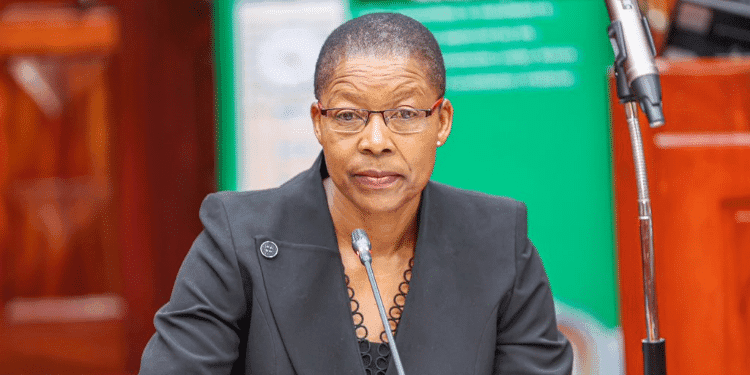We're loading the full news article for you. This includes the article content, images, author information, and related articles.
Attorney General Dorcas Oduor has urged the High Court to dismiss a petition challenging the legality of presidential advisor appointments, asserting that the process adhered to constitutional provisions and public service regulations.

The Attorney General (AG), Dorcas Oduor, has asked the High Court to dismiss a lawsuit challenging the appointment of presidential advisors, maintaining that the appointments were legally sound and followed all due procedures. In documents filed in court on Wednesday, October 8, 2025, the AG argued that the petition by Katiba Institute was "misconceived, speculative and legally unsustainable."
The AG, listed as the first respondent, contended that the lawsuit is based on a misunderstanding of the constitutional framework governing presidential powers. The appointments, according to the AG, are an internal administrative process within the Executive Office of the President and do not necessitate parliamentary approval or public participation.
The Katiba Institute, a governance and constitutional watchdog, filed the petition in May 2025, challenging the legality of President William Ruto's creation and appointment of new presidential advisors. The lobby group argued that the President lacked the constitutional authority to unilaterally create and fill these offices without parliamentary approval or clear legal provisions. They sought to have the High Court nullify the appointments, claiming they were made secretly and without proper legal authority.
This legal challenge comes amidst a broader public debate regarding the size and cost of the presidential advisory team. In May 2024, David Ndii, a key economic advisor, defended the political nature of such appointments, stating that advisors, much like cabinet members, are often chosen based on their personal ties to the president and their contributions to the election campaign and manifesto.
The Attorney General's defense hinges on Article 132(4)(a) of the Constitution of Kenya, which empowers the President to establish offices within the public service upon the recommendation of the Public Service Commission (PSC). Additionally, the AG cited Regulation 27 of the Public Service Commission Regulations, 2020, which provides a legal framework for appointing advisors to the President, Deputy President, and Cabinet Secretaries.
The AG further argued that granting the orders sought by Katiba Institute would amount to judicial overreach and violate the doctrine of separation of powers by interfering with executive discretion.
The Katiba Institute's petition named the State Law Office, the Salaries and Remuneration Commission (SRC), and one other party as respondents. The Salaries and Remuneration Commission (SRC) has also opposed the petition, stating that it has no role in the appointment of presidential advisors and that no specific relief has been sought against it.
The outcome of this case could have significant implications for the exercise of presidential powers in Kenya, particularly concerning appointments within the Executive Office. A ruling in favour of the Katiba Institute could set a precedent requiring greater parliamentary oversight and public participation in the appointment of presidential advisors. Conversely, a ruling in favour of the Attorney General would affirm the President's prerogative in establishing such offices and making appointments based on existing constitutional and regulatory frameworks.
The exact number of presidential advisors appointed by President Ruto has been a point of contention. While some reports indicated an increase in the number of advisors, the precise figure and the full scope of their roles and remuneration remain subjects of public discussion. The petition by Katiba Institute specifically challenges the appointment of 21 advisors.
The High Court, presided over by Justice Bahati Mwamuye, has granted the Attorney General leave to file a Preliminary Objection by Thursday, October 17, 2025, specifically addressing the inclusion of President William Ruto as a respondent. The petitioner is expected to respond by Thursday, October 31, 2025. Written submissions from both parties are to be filed within these timelines, with a judgment expected to be delivered on Wednesday, December 11, 2025.
All eyes will be on the High Court's decision, which will clarify the constitutional boundaries of presidential appointments and the role of public participation and parliamentary oversight in such processes. The ruling could redefine the relationship between the Executive and other arms of government, particularly the Judiciary, in matters of governance and public service appointments.
Keep the conversation in one place—threads here stay linked to the story and in the forums.
Sign in to start a discussion
Start a conversation about this story and keep it linked here.
Other hot threads
E-sports and Gaming Community in Kenya
Active 9 months ago
The Role of Technology in Modern Agriculture (AgriTech)
Active 9 months ago
Popular Recreational Activities Across Counties
Active 9 months ago
Investing in Youth Sports Development Programs
Active 9 months ago
Key figures and persons of interest featured in this article